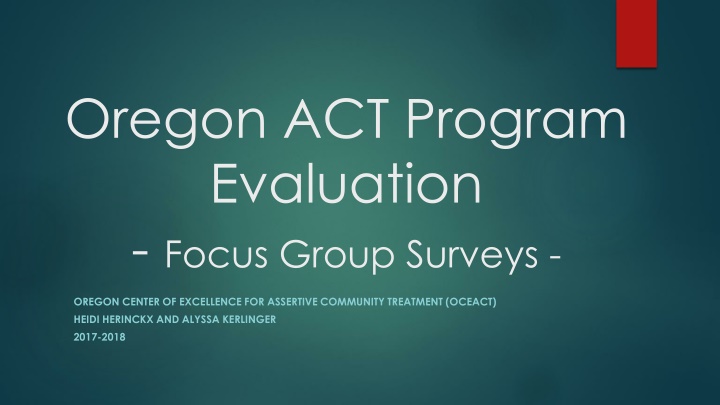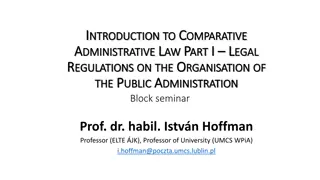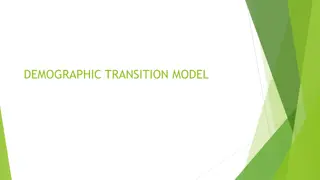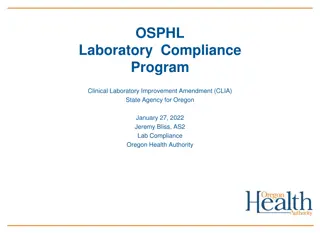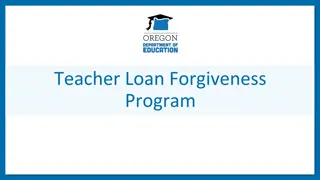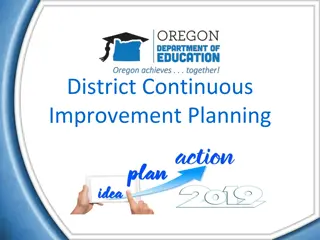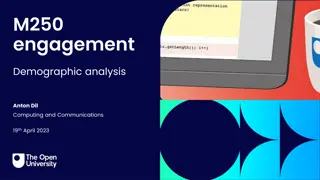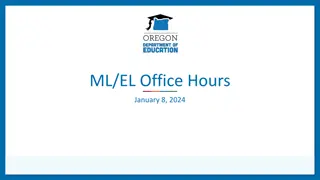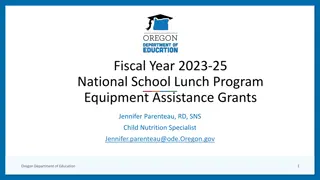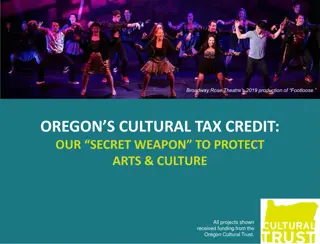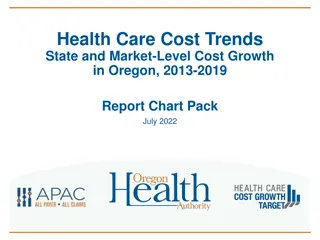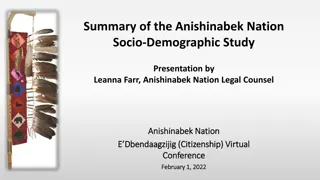Demographic Comparison for Representativeness in Oregon ACT Program Evaluation Focus Groups
The study evaluates the representativeness of focus group samples in the Oregon ACT Program. It compares demographic characteristics such as age, gender, race/ethnicity, medication use, and days homeless between the entire ACT population and focus group participants. The findings show differences in various demographic aspects, indicating potential discrepancies in representativeness.
Download Presentation

Please find below an Image/Link to download the presentation.
The content on the website is provided AS IS for your information and personal use only. It may not be sold, licensed, or shared on other websites without obtaining consent from the author.If you encounter any issues during the download, it is possible that the publisher has removed the file from their server.
You are allowed to download the files provided on this website for personal or commercial use, subject to the condition that they are used lawfully. All files are the property of their respective owners.
The content on the website is provided AS IS for your information and personal use only. It may not be sold, licensed, or shared on other websites without obtaining consent from the author.
E N D
Presentation Transcript
Oregon ACT Program Evaluation - Focus Group Surveys - OREGON CENTER OF EXCELLENCE FOR ASSERTIVE COMMUNITY TREATMENT (OCEACT) HEIDI HERINCKX AND ALYSSA KERLINGER 2017-2018
Focus Groups 156 ACT participants total Focus groups ranged from 1-12 participants and almost every ACT team participated Length: 1 hour 30 minutes for open-ended questions 30 minutes for survey/assessments $20 grocery store gift card incentive
Is the focus group sample representative of the entire ACT population?
Demographic Comparison for Representativeness Average Age of ACT Participants Percentage Hospitalized Average Years in ACT Entire ACT Population Focus Group Sample Entire ACT Population Percent Focus Group Sample Percent Entire ACT Population Focus Group Sample 9% 2.6% Hospitalization percentage 2.19 2.0 Year Mean Age Mean 44.6 44
Demographic Comparison for Representativeness Gender Race/Ethnicity Entire ACT Population Focus Group Sample Difference Entire ACT Population Focus Group Sample Difference Gender 6.7% 8.3% 1.6% American Indian/Alaskan Native Asian Female 39.3% 32.7% -6.6% Male 59.6% 62.2% 2.6% 2.2% 0.3% 5.4% 2.6% 0.6% 3.8% 0.4% 0.3% -1.6% Transmale/ Transman Transfemale/ Transwoman Other Identity0.4% 0.3% 1.3% 1% Arab 0.5% 0 -0.5% Black or African American Caucasian/White 0.6% 0.2% 77.2% 3.9% 0.6% 73.7% 3.2% 0.6% -3.5% -0.7% 0 Hispanic or Latino Pacific Islander or Native Hawaiian Other 3.8% 3.8% 0
Demographic Comparison for Representativeness Percentage of Days Homeless Percentage of Medication Use Med Use Entire ACT Population 44.3% Focus Group Sample 55.1% Difference Entire ACT Population Focus Group Sample Days Home- less 0 days Difference Participant likes taking medications and takes them 10.8% 73.8% 78.8% 5% Hospitalization 1.6% 1-15 days 0.6% -1% Participant likes taking medication and does not take them 3.2% 1.9% -1.3% 16-30 days 0.9% 2.6% 1.7% 31-45 days 0.2% 0.6% 0.4% Participant does not like taking medications but takes them 26.3% 23.1% -3.2% 45 or more days Missing 13.6% 10.3% -3.3% 9.9% 7.1% -2.8% Participant does not like taking medications and does not take them 10.3% 6.4% -3.9% Not prescribed psych medications Missing 6.4% 6.2% -0.2% -2.6% 9.7% 7.1%
Demographic Comparison for Representativeness ACT Team Breakdown by Population Density Frontier Rural Urban NARA Northwest Linn County Mental Health Lutheran Community Services NW Options for Southern Oregon Community Counseling Solutions Mid-Columbia Center for Living Columbia Community Mental Health Deschutes County Health Services Cascadia FACT Klamath Basin Behavioral Health Polk County Behavioral Health Jackson County Mental health Outside In Lifeways Malheur Center for Human Development Yamhill County Mental Health Laurel Hill Center Telecare Inc. Symmetry Care Curry Community Health Cascadia Clackamas Wallowa Valley Center for Wellness Benton County Behavioral Health Marion County Mental Health Central City Concern Compass/ADAPT Clatsop Behavioral Health Care Lifeworks Northwest Lifeways Umatilla Coos Health and Wellness South Lane Mental Health Tillamook Family Counseling Center
Demographic Comparison for Representativeness Population Density Comparison Entire ACT population Focus Group Sample N % N % Frontier 66 6.1% 17 10.9% Rural 334 30.7% 67 42.9% Urban 687 63.2% 72 46.2%
How Representative is the Focus Group Sample? Representative: Average Age 44 years old Average Years in ACT 2 years Race/ethnicity breakdown Homeless when compared as yes/no (homeless or not) Focus Group Sample Differences: Population Density: overrepresented rural teams Gender: slightly more males Medication Focus Group Samples were more likely to take their medications and like taking them. Hospitalizations: less hospitalizations then the rest of the population.
Social Support Assessment Roommate Friend Family Children Significant Other Spiritual/Religious Group Co-worker Neighbor
Social Support Do you have a relationship with these social supports? Total: 156 Focus Group Participants Roommate Friend Family Child Significant other Spiritual or Religious Group N % 57 Co-worker Neighbor N % 57 37% N % 134 N % 126 N % N % 50 N % 29 N % 80 Yes 86% 81% 63 40% 32% 37% 19% 51% No 97 62% 21 14% 28 18% 87 56% 99 64% 90 58% 121 78% 66 42% Missing 2 1% 1 6% 2 1% 5 3% 7 5% 9 6% 6 4% 10 6%
Social Support Which social supports did people most report having a relationship with? *Focus Group Sample= 156 people Ranked from most to least: 1. Friend (n=134) 2. Family (n=126) 3. Neighbor (n=80) 4. Child (n=63) 5. Spiritual or Religious Group (n=57) 6. Roommate (n=57) 7. Significant Other (n=50) 8. Co-worker (n=29)
Social Support How many different kind of social supports do people report they have a relationship with? 30% 27% 25% 20% 21% 19% 15% 13% 10% 9% 5% 5% 3% 1% 3% 0% 0 1 2 3 4 5 6 7 8 Total # of Social Supports
Social Support If reported yes to having a relationship - Is your relationship positive, negative, or both? 79% 76% 69% 63% 61% 58% 54% 51% 35% 32% 32% 28% 26% 25% 3% 4% 10% 14% 11% 12% 10% 8% 6% 6% 5% 2% 3% 3% 4% 4% 4% 3% Roommate Friend Family Children Significant Other Spiritual and Religious Group Co-worker Neighbor Positive Negative Both Missing
Social Support How often do you spend time with each social support? Roommate Friend Family Child Significant Other Spiritual and Religious Group N % Co-worker Neighbor N % N % N % N % N % N % N % Less than once a year 0 0% 3 2% 11 9% 17 27% 6 12% 2 4% 1 3% 5 6% Once a year or more 0 0% 7 5% 25 20% 12 19% 4 8% 4 7% 1 3% 1 1% Once a month or more 0 0% 15 11% 28 22% 9 14% 3 6% 6 11% 3 10% 9 11% Once a week or more 9 16% 78 58% 46 37% 14 22% 18 36% 35 61% 15 52% 39 49% Everyday 45 79% 27 20% 12 10% 8 13% 17 34% 7 12% 5 17% 23 29% Missing 3 5% 4 3% 4 3% 3 5% 2 4% 3 5% 4 14% 3 4%
Social Support How often are people spending time with their social supports? 90 80 Roommate 70 Friends Family 60 Children 50 Significant Other 40 Spiritual or Religious Group 30 Co-worker 20 Neighbor 10 0 Less than once a year Once a year or more Once a month or more Once a week or more Everyday Missing
Social Support How satisfied are people with their relationships? Highly/Very Satisfied 65% Satisfied Not/Little Satisfaction 11% ***Ordered by highest satisfaction rate. Spiritual/Religious Group Friend 24% High satisfaction rates 54% 32% 14% Children (41%), Significant Other (22%) and Family (24%) were the top 3 relationships that people were least satisfied with. Roommate 53% 31% 16% Co-worker 47% 36% 17% Significant other 46% 32% 22% Family 40% 36% 24% Children 37% 22% 41% Neighbor 36% 48% 16%
Social Support Do you want to improve your relationship or have a relationship? Yes Relationship & Yes Improve 57 106 112 36 % (out of those who said yes) No relationship BUT Yes Want One 11 41 9 25 % (out of those who said no) Child Family Friend Significant Other 89% 84% 84% 72% Friend Significant Other Family Roommate 52% 41% 32% 26% Religious/Spiritual Group Roommate 40 71% Religious/Spiritual Group Neighbor 21 23% 32 56% 13 20% Co-worker 15 52% Co-worker 16 13% Neighbor 45 56% Child n/a n/a
Social Support Would you like to have a relationship or improve your relationship? (this includes those who reported not having a relationship) 25% % of ACT Participants 20% 20% 20% 18% 17% 15% 10% 9% 8% 5% 5% 3% 1% 0% .00 1.00 2.00 3.00 4.00 5.00 6.00 7.00 8.00 Total Number of Relationships Participants Want to Improve
Social Support Summary Out of 156 focus group participants, the most frequent relationships they reported having were family (n=126) and friends (134). Co-workers were the least frequently reported relationship by the focus group participants (n=29). Out of 8 different kinds of social supports that were asked about, the majority of participants reported having between 3-5 different kinds of social supports. Describe relationship: Spending time with social supports every week if not more! High satisfaction rates across almost all social supports. Top 3 most satisfied with Friends, Spiritual and religious group, and roommates. Participants reported low dissatisfaction rates (all under 18%) except: Children (41%), Significant Other (22%) and Family (24%) were the top 3 relationships that people were least satisfied with. Improve/Build Relationship: Children (top rated for those who have children) Family Friends Significant other
Recovery Self-Assessment Frontier 4.2 4.4 4.2 4.4 4.5 4.7 4.4 4.5 Rural 4.0 3.9 4.0 4.3 4.3 4 4.2 4.3 Urban 3.9 4 3.6 4.4 4.4 4 4.3 4.2 RSA_1 ACT staff help me build connections in my neighborhood and community RSA_2 ACT staff involve my social supports RSA_3 ACT contact is done in community RSA_4 ACT staff discuss and help me progress towards goals regularly RSA_5 ACT staff do not use threats or bribes RSA_6 ACT staff link me to mentors RSA_7 When I complete a goal, ACT celebrates with me RSA_8 ACT staff use language of recovery 4.5 3.8 3.9 RSA_9 ACT staff help me get involved in non-mental health related activities 4.5 3.8 3.6 3.2 3.8 4.2 52.5 4.1 3.7 3.2 3.7 4.2 50.3 RSA_10 ACT staff assist me with employment and education goals RSA_11 ACT staff help me get involved with activities that give back to my community 4.6 RSA_12 Criteria for graduation discussed at enrollment into ACT 4 4.4 4.6 59.1 RSA_13 ACT team focuses on helping me develop leisure activities and hobbies RSA_14 ACT staff believes I can recover and make my own treatment and life choices Total Score Average (out of 70)
Recovery Self-Assessment Compare Average Fidelity Intensity of Service Score with RSA #3 contact done in the community average response Frontier Rural Urban RSA_3 ACT contact done in community average scores 4.2 4.0 3.6 5 4.6 4.4 Fidelity - Intensity of service - average scores
Illness Management and Recovery Assessment
IMR Assessment Frontier Rural 3.5 4.1 3.3 3.5 Urban 3.4 4 2.8 2.7 3.6 3.9 2.7 3 IMR_1 In the past three months, I have come up with personal goals and I am achieving them. IMR_2 How much do you feel like you know about symptoms, treatment, coping strategies IMR_3 How much do your symptoms bother you? IMR_4 How much do your symptoms get in the way of you doing things that you would like to or need to do? IMR_5 Which of the following would best describe what you know or have done in order to avoid your symptoms getting worse? 1 I don t know what to do up to 5 I have a written plan that is shared with others 3.7 3.8 3.6 3.4 4.3 3.2 4.1 2.9 4.3 IMR_6 When is the last time you had an increase in symptoms or experienced crisis? Up to a year. IMR_7 When is the last time you were hospitalized for mental health or substance abuse reasons? Up to a year 3.8 3.4 3.6 IMR_8 How well do you feel like you are coping with your mental or emotional illness from day to day? 4.7 4.4 8.1 46.2 4.7 4.5 7 42.2 4.5 4.4 7.1 42.1 IMR_10 Overall life functioning affected by alcohol use IMR_11 Overall life functioning affected by drug use Quality of Life (1-10) Total Average Score (without #9, out of 60)
IMR Assessment How did participants responses to how often do you take your medication as prescribed? compare to OAD medication adherence reporting? OAD MedicationAdherence Variable Participant does not like taking medications and does not take them Participant does not like taking medications but takes them Participant likes taking medication and does not take them Participant likes taking medications and takes them Missing OAD Med Data Not prescribed psych medications Total IMR Survey Responses to How often do you take your medication as prescribed? 1 0 6 0 1 0 2 1 0 1 1 0 1 0 0 1 0 0 3 0 1 1 13 2 3 4 No Meds Never Occasionally 0 About half the time Most of the time Everyday 2 1 0 1 2 0 9 13 6 10 2 9 2 7 27 31 2 3 63 77 102 137 Total
Conclusion Main Takeaways: The majority of participants are seeing social supports weekly or daily! Only 1% reported having NO social supports! (majority report 3-5) Participants value working on and improving their social relationships, even if they already have them. Children, Family and Significant Other relationships are the lease satisfactory and the relationships that most participants want to improve. ACT Participants feel like their ACT teams are helping them work towards their recovery well. Rural and Urban participants see a lower score in their Illness Management and Recovery average scores. ACT teams are accurately able to reflect participant s medication use.
More program evaluation info to be shared at the conference Hope to see you there!
